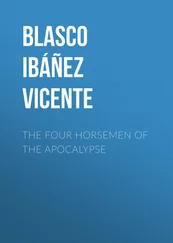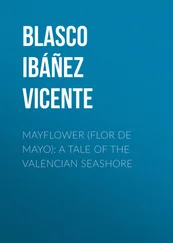Vicente Blasco Ibáñez - The Dead Command
Здесь есть возможность читать онлайн «Vicente Blasco Ibáñez - The Dead Command» — ознакомительный отрывок электронной книги совершенно бесплатно, а после прочтения отрывка купить полную версию. В некоторых случаях можно слушать аудио, скачать через торрент в формате fb2 и присутствует краткое содержание. Жанр: foreign_prose, foreign_antique, на английском языке. Описание произведения, (предисловие) а так же отзывы посетителей доступны на портале библиотеки ЛибКат.
- Название:The Dead Command
- Автор:
- Жанр:
- Год:неизвестен
- ISBN:нет данных
- Рейтинг книги:5 / 5. Голосов: 1
-
Избранное:Добавить в избранное
- Отзывы:
-
Ваша оценка:
- 100
- 1
- 2
- 3
- 4
- 5
The Dead Command: краткое содержание, описание и аннотация
Предлагаем к чтению аннотацию, описание, краткое содержание или предисловие (зависит от того, что написал сам автор книги «The Dead Command»). Если вы не нашли необходимую информацию о книге — напишите в комментариях, мы постараемся отыскать её.
The Dead Command — читать онлайн ознакомительный отрывок
Ниже представлен текст книги, разбитый по страницам. Система сохранения места последней прочитанной страницы, позволяет с удобством читать онлайн бесплатно книгу «The Dead Command», без необходимости каждый раз заново искать на чём Вы остановились. Поставьте закладку, и сможете в любой момент перейти на страницу, на которой закончили чтение.
Интервал:
Закладка:
When he returned to the Peninsula to continue his interminable studies, he went refreshed by the country life, sure of himself after his practice in the garden and eager to have the longed for duel with the first man who should give him the slightest pretext. But as he was a courteous person, incapable of unjust provocation, with manners that inspired respect from the insolent, time passed and the duel did not take place. His exuberant vitality, his impulsive strength, were consumed in dark adventures, of which his fellow students afterward told on the island with admiration.
While in Barcelona he received a telegram announcing that his mother was seriously ill. He was delayed two days before sailing; there was no boat ready. When he reached the island his mother was dead. Of the ancient family which he had seen in his childhood none remained. Only Mammy Antonia could recall the past.
Jaime was twenty-three when he found himself master of the Febrer fortune, and in absolute liberty. The fortune had been diminished by the ostentation of his ancestors and burdened with encumbrances. The Febrer house was big. It was like vessels which when wrecked and lost forever enrich the coast where they are dashed to pieces. The remains and spoils, upon which his ancestors would have looked with scorn, still represented a fortune. Jaime did not wish to think. He did not wish to know. He must live; he must see the world! So he gave up his studies. What need had he for law, and for Roman customs, and for ecclesiastical canons, in order to lead a gay existence? He knew enough. In reality, the most delightful of his accomplishments he owed to his mother. When he was a child still living in the palace, before he had ever seen a schoolmaster, she had taught him something of French and had given him a little instruction on an ancient piano with yellow keys and a great red silk reredos almost touching the ceiling. Others knew less than he, and yet they were just as gentlemanly and they were much happier. Now for life! He stayed two years in Madrid; where he affected mistresses who gave him a certain notoriety, and drove famous horses. He became the intimate friend of a celebrated bull-fighter, and he gambled heavily in the clubs on Alcalá Street. He fought a duel, but with swords, instead of lying on the ground, pistol in hand, as he had formerly pictured to himself, and he came out of the affair with a scratch on his arm, something in the nature of a pin prick in the epidermis of an elephant. He was no longer "the Majorcan with the ounces." The hoard of round gold pieces treasured by his mother had vanished. He now flung bank bills prodigally upon the gaming tables, and when bad luck assailed him he wrote to his administrator, a lawyer, the scion of a family of old time mossons, retainers of the Febrers during many centuries.
Jaime wearied of Madrid, where he felt himself essentially a stranger. The soul of the ancient Febrers lingered within him—those travelers through all countries except Spain, for they had ever lived with their backs turned upon their sovereigns. Many of his ancestors were familiar with every one of the important Mediterranean cities, they had visited the princes of the small Italian states, they had been received in audience by the Pope and by the Grand Turk, but never had it occurred to them to visit Madrid. Moreover, Febrer was often irritated with his relatives in the court city—youths proud of their noble titles who smiled at his odd appellation of butifarra. With what indifference his family had allowed various marquisates to descend to relatives on the Peninsula while they clung to their supreme title of island nobility and the high knightly rank of Malta!
He began to run over Europe, fixing his residence in the autumn and during part of the winter in Paris; spending the cold months on the Blue Coast; spring in London; summer in Ostend; with various trips to Italy, Egypt, and Norway to see the midnight sun. In this new existence he was barely known. He was one traveler more, an insignificant circulating globule in the great arterial network which desire for travel extends over the Continent; but this life of continual movement, of tedious monotony, and unexpected adventures, satisfied his hereditary instinct, the inclinations transmitted from his remote ancestors, constant visitors among new peoples. This wandering existence, also, satiated his longing for the extraordinary. In the hotels at Nice, phalansteries of the most polite and hypocritical worldly corruption, he had been flattered in the seclusion of his room by unexpected visits. In Egypt he had been compelled to flee from the caresses of a decadent Hungarian countess, a withered flower of elegance, with moist eyes and violent perfume.
He passed his twenty-eighth birthday in Munich. A short time before he had gone to Bayreuth to hear the Wagnerian operas, and now in the capital of Bavaria he attended the theater of the Residence, where the Mozart festival was celebrated. Jaime was not a melomaniac, but his vagrant existence forced him with the crowd, and his accomplishment as an amateur pianist had led him to make his musical pilgrimage for two consecutive years.
In the hotel in Munich he met Miss Mary Gordon, whom he had seen before at the Wagner theater. She was an English girl, tall, slender, with firm flesh and the body of a gymnast which exercise had developed into agreeable feminine curves, giving her a youthful figure, and the wholesome, asexual appearance of a handsome boy. Her beautiful head was that of a court page, with skin as transparent as porcelain, pink nostrils like those of a toy dog, deep blue eyes and blonde hair, pale gold on the surface and dark gold beneath. Her beauty was adorable but fragile; that British beauty which is lost at thirty beneath purplish flushes and blotches on the skin.
In the restaurant Jaime had several times surprised the gaze of her blue eyes, frankly, tranquilly bold, fixed upon him. She was attended by a fat, spongy woman with rouged cheeks, a traveling companion dressed in black with a red straw hat and a broad belt of the same color, which divided the bulky hemispheres of her breast and abdomen. Young and graceful, Mary Gordon resembled a flower of gold and nacre in her white flannel suits of masculine cut with a mannish cravat, and a Panama with drooping brim around which she wound a blue veil.
Febrer met the pair at every turn; in the picture gallery, standing before Durer's Evangelists; in the hall of sculpture examining Egina's marbles; in the rococo theater of the Residence, where Mozart was sung, an audience hall of a former century, with decorations of porcelain and garlands which seemed to require that the spectators wear the purple heel and the white wig. Accustomed to meeting each other, Jaime greeted her with a smile and she seemed to answer timidly with the flash of her eyes.
One morning, on coming out of his room, he met the English girl on a landing of the stairway. She was bending her boyish breast over the balustrade.
"Lift! Lift!" she called with her birdlike voice, summoning the elevator man to bring it up.
Febrer bowed as he entered the movable cage with her, and said a few words in French to start a conversation. The English girl stared at him in silence with her light blue eyes in which a star of gold seemed to be floating. She remained silent as if she did not understand, yet Jaime had seen her in the reading room turning the leaves of the Parisian dailies.
Stepping out of the elevator she turned with hasty step toward the office where sat the hotel clerk, pen in hand. He listened with obsequious mien, like a polyglot quick to understand each of his guests, and coming out from his enclosure he made straight toward Jaime, who, still embarrassed by his unsuccessful venture, was pretending to read the advertisements in the vestibule. Febrer at first did not realize that it was he who was being addressed.
Читать дальшеИнтервал:
Закладка:
Похожие книги на «The Dead Command»
Представляем Вашему вниманию похожие книги на «The Dead Command» списком для выбора. Мы отобрали схожую по названию и смыслу литературу в надежде предоставить читателям больше вариантов отыскать новые, интересные, ещё непрочитанные произведения.
Обсуждение, отзывы о книге «The Dead Command» и просто собственные мнения читателей. Оставьте ваши комментарии, напишите, что Вы думаете о произведении, его смысле или главных героях. Укажите что конкретно понравилось, а что нет, и почему Вы так считаете.












